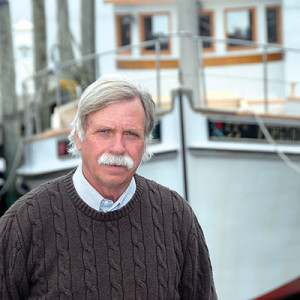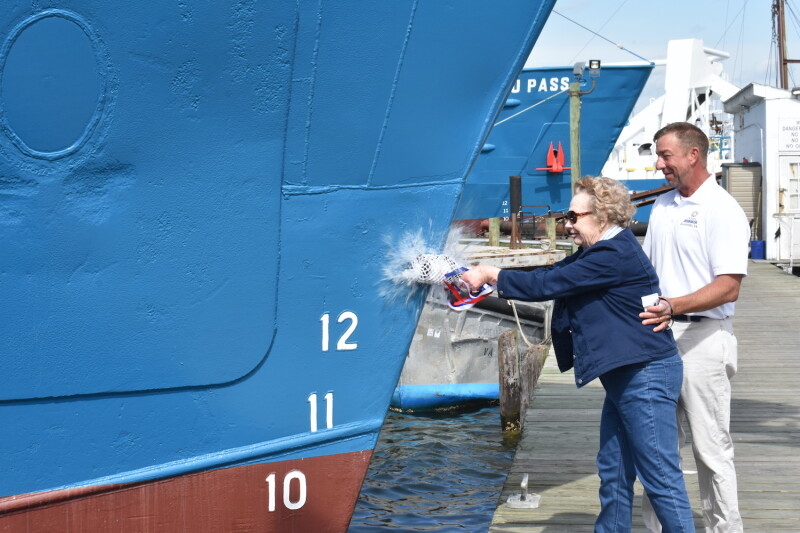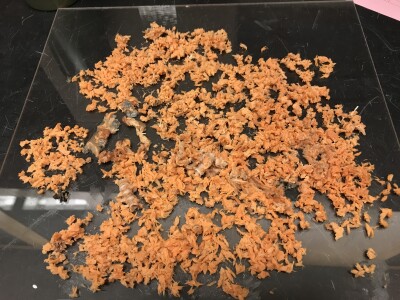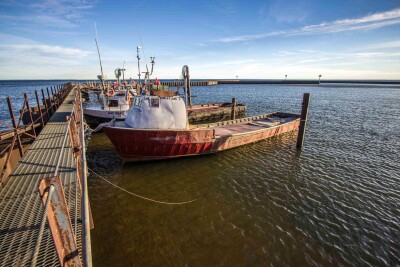Omega Shipyard in Moss Point, Miss., recently delivered the $8 million 180’x40’ F/V Reedville to Ocean Harvesters, suppliers to Omega Protein in Reedville, Va.
A traditional maritime christening ceremony of the F/V Reedville and F/V Little River was held on Saturday, April 22, to kick off the 2023 menhaden fishing season starting May 8.
With the new season, there's hope that an agreement between menhaden fishermen, Virginia state officials, and other Chesapeake Bay user groups will reduce longstanding conflicts.
The christening was held on the docks at the Reedville plant, where the company’s fleet of nine fish steamers are moored. The 180’x40’x7’ Little River was not christened at the time of delivery in 2020 because of the covid-19 pandemic.
The Reedville, Little River, and the F/V Carters Creek, delivered in 2017, are all converted hulls from offshore supply vessels (OSVs) formerly employed in the offshore oil and gas industry. The three finished boats are almost identical.
The ceremony started with the singing of the National Anthem by Charlotte Blackwell, 10, daughter of Capt. William Blackwell, who is the master of the F/V Reedville.
Hannah Long, environmental manager of Omega Protein, was the master of ceremonies for the event, and she told the history behind the ancient ceremony of christening a boat for “good luck.”
She said ancient Greeks and Romans christened their vessels, and the tradition was passed down through the generations. The first documented christening in the United States was in 1797 with the Navy’s sailing frigate USS Constitution, and the first documented use of champagne to christen a boat was in 1890 on the USS Maine, the Navy’s first steel battleship.
Long said there was a period during Prohibition in the 1920s when apple cider or waters taken from the fishing grounds where the boat worked were used – because champagne, as an alcoholic beverage, was an illegal substance under federal law.
Ocean Harvesters CEO Monty Deihl said that F/V Reedville is a multi-million dollar investment for the company and a sign that Omega Protein plans to continue to fish and provide jobs on Virginia’s Northern Neck.
“There has been a plant here since 1878, and this type of investment will enable us to be here for the next 50 years,” he said.
Rev. Dr. Linwood T. Blizzard II of Macedonia Baptist Church blessed the fleet with the message that the F/V Reedville is a long-term investment in the community.
“This type of investment is symbolic of how God wants us to reinvent our earnings that he has provided so we can continue to benefit our community,” he said.
Three sisters – Kathy Deihl, Kelly Walker, and Kristy Hall, who were born and raised in a fishing family in Reedville – broke the bottle of champagne on the bow of the F/V Reedville with much of the content splashing their way. Right after the christening, the horn of the F/V Reedville sounded.
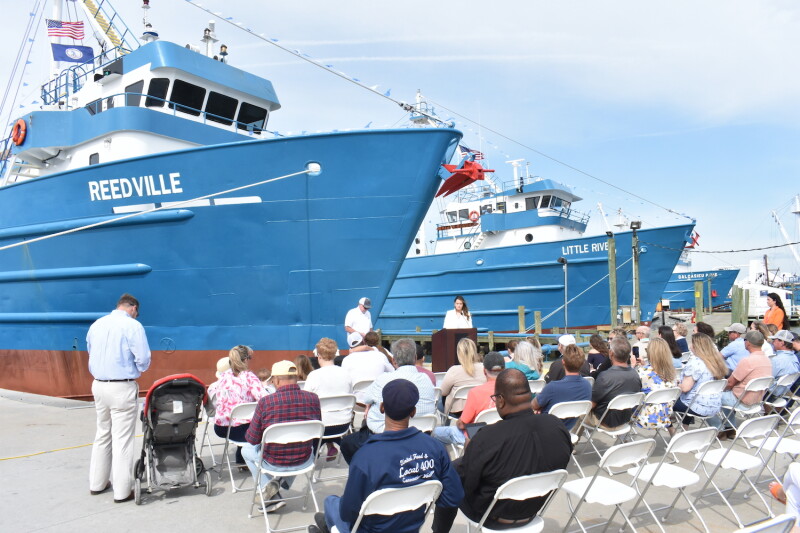
Faye Hall, who has multi-generational ties to the Reedville fishing industry and is thus perhaps a veteran of the christening process, christened the F/V Little River by smashing the bottle in a way that the champagne splashed away from her.
Toward the end of the ceremony, a prayer was offered by Andy Hall, general manager of Ocean Harvesters, who prayed for good weather, good fishing and a safe return home of all vessels and fishermen during the upcoming fishing season.
“This MOU further illustrates that the menhaden fishery will work with the Bay community to alleviate concerns and to remain operating responsibly and sustainably here in Virginia,” said Diehl.
According to Ocean Harvesters, key points in the agreement include:
- The MOU outlines areas within the Bay where the fishery may only harvest in waters more than one mile from shore. These areas were identified as concentrated regions for tourists and other user groups around the Bay. Specifically, the areas are offshore from the populated areas of Virginia’s lower Eastern Shore and Hampton Roads/Virginia Beach.
- In response to feedback on how the fishery can best avoid conflicts with recreational fishing, the MOU will place new limits on the times and places where the menhaden fishery will operate. The MOU states that between Memorial Day and Labor Day, the fishery will not harvest menhaden in the Chesapeake Bay on weekends, nor on the Memorial or Labor Day holidays, nor on the days surrounding July 4 – the most popular time for summer tourism and recreational fishing.
- The MOU further restricts the fishery from operating within a half-mile of the Chesapeake Bay Bridge Tunnel year-round. This will help the fishery avoid recreational boat traffic and any other potential issues and conflicts that might arise near the bridge.




